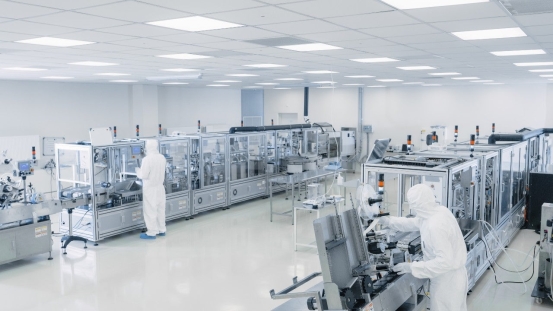Health
Transformative Forces Driving Biopharma Manufacturing Evolution
The biopharmaceutical industry is evolving rapidly, driven by technological advances and shifts in supply chain dynamics. Companies are increasingly adopting strategies like vertical integration and automation to enhance efficiency, reduce costs, and remain competitive. These innovations are reshaping the production and delivery of drugs, with long-term implications for patient access and industry growth.
The biopharmaceutical industry is evolving rapidly, driven by technological advances and shifts in supply chain dynamics. Companies are increasingly adopting strategies like vertical integration and automation to enhance efficiency, reduce costs, and remain competitive. These innovations are reshaping the production and delivery of drugs, with long-term implications for patient access and industry growth.

The Ascent of End-to-End Control
Advantages of Owning the Process
Vertical integration is emerging as a core strategy in biopharma. By taking control of multiple stages—from research and clinical trials to manufacturing and distribution—companies reduce reliance on Contract Research Organizations (CROs) and external vendors. This internalization enhances oversight of timelines, data quality, and intellectual property, allowing more efficient clinical trial operations and faster regulatory responses. While in-house capabilities require upfront investment, they offer long-term savings, improved operational efficiency, and greater pricing flexibility. Ultimately, controlling the full process empowers companies to leverage data-driven insights, accelerate innovation, and deliver therapies more effectively, establishing sustainable leadership in the biotech sector.
Data-Driven Decisions and Regulatory Agility
End-to-end control also transforms operational and strategic decision-making. Direct oversight of the drug lifecycle generates proprietary data, offering insights into efficacy, safety, and production bottlenecks. Companies can use this data to optimize processes, accelerate drug development, and proactively respond to regulatory changes. Vertical integration allows firms to ensure compliance at every stage, reducing the risk of setbacks and enabling faster adaptation to evolving standards. In essence, this approach strengthens a company’s ability to innovate, remain agile, and maintain leadership in a competitive landscape.
The Impact of Smart Factories
Enhancing Efficiency and Scalability
Smart factory technologies, including artificial intelligence (AI) and automation, are revolutionizing drug manufacturing. These tools optimize production schedules, predict equipment failures, and minimize human error, resulting in faster, more reliable, and cost-effective production. Automation also increases throughput while reducing labor dependency. Smart factories offer unparalleled scalability, allowing rapid adaptation to fluctuating demand due to regulatory approvals, disease outbreaks, or other market factors, ensuring consistent patient access without supply chain disruption.
Regionalization and Patient-Centric Integration
Smart technologies also support regionalized manufacturing closer to end markets, mitigating reliance on vulnerable global supply chains. Smaller, agile facilities can meet local demand efficiently while improving drug accessibility. Additionally, digital integration enables traceability throughout the supply chain, reducing counterfeiting and ensuring timely, secure delivery. Linking manufacturing to patient data systems facilitates personalized medicine approaches, tailoring dosages and treatment regimens to individual needs, improving outcomes, and reducing side effects.
Biosimilars and Strategic Mergers
Securing Supply Chains and Margins
The growth of biosimilars and generics is reshaping biopharma, prompting mergers and acquisitions (M&A) that reinforce vertical integration. Biosimilars, affordable alternatives to biologics, increase competition, motivating companies to acquire or merge with manufacturers to secure supply chains, reduce costs, and improve efficiency. Vertical integration here is a strategic defense, ensuring long-term sustainability amid market pressures. M&A activity focuses on advanced manufacturing technologies, specialized expertise, and strategic locations, building resilient business models.
Competitive Positioning Through Integration
Beyond cost reduction, integration strengthens market positioning. Controlling the full value chain—from R&D to distribution—enables faster market response, enhanced innovation, and expanded product offerings. Integrated companies can negotiate value-based contracts and bundled pricing with payers, gaining a competitive advantage in a pricing-sensitive market. Strategic M&A, fueled by biosimilar competition, is creating companies that are more efficient, innovative, and resilient, ready to thrive where affordability and value drive industry success.
References
https://www.sciencedirect.com/science/article/pii/S0167779924002890
How do you like this article?




